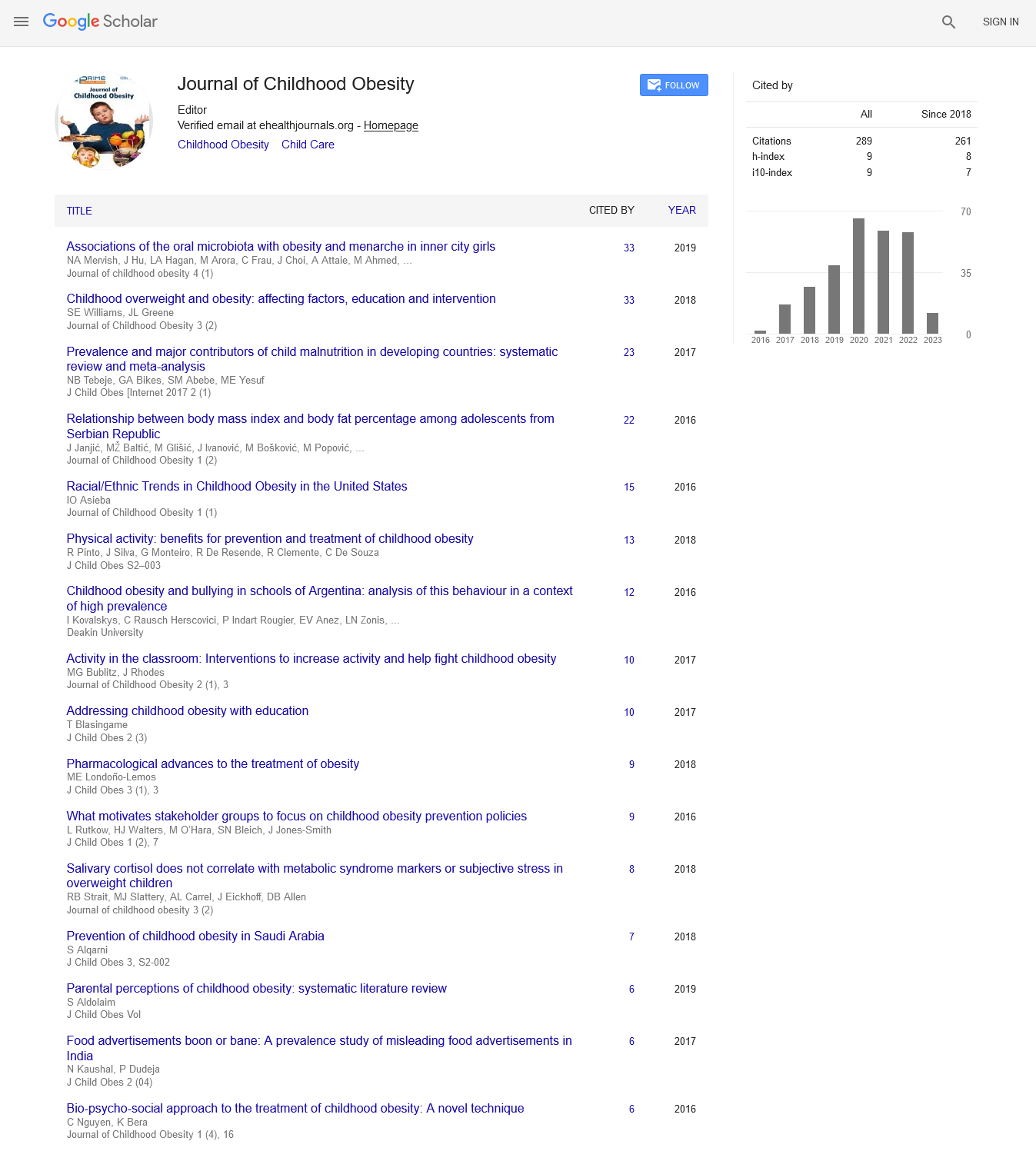Opinion - (2023) Volume 8, Issue 2
Vitamin Deficiency in Obese Children: Causes, Consequences, and Prevention Strategies
Seung-Soon Im*
Department of Nutrition, Pompe Fabra University, Korea
*Correspondence:
Seung-Soon Im,
Department of Nutrition, Pompe Fabra University,
Korea,
Email:
Received: 29-Mar-2023, Manuscript No. IPJCO-23-16525;
Editor assigned: 31-Mar-2023, Pre QC No. IPJCO-23-16525 (PQ);
Reviewed: 14-Apr-2023, QC No. IPJCO-23-16525;
Revised: 19-Apr-2023, Manuscript No. IPJCO-23-16525 (R);
Published:
26-Apr-2023, DOI: 10.36648/2572-5394-8.2.11
Introduction
Obesity has become a global epidemic, affecting millions of children
worldwide. Along with the well-known health risks associated
with obesity, such as cardiovascular disease and diabetes, it is
important to recognize the impact of excess weight on nutritional
status. Vitamin deficiency is one such consequence that often affects
obese children. This article will delve into the causes, consequences,
and prevention strategies related to vitamin deficiency
in obese children.
Description
Causes of Vitamin Deficiency in Obese Children
1. Inadequate dietary intake: Obese children often consume
energy-dense, nutrient-poor foods, leading to an imbalanced
diet deficient in essential vitamins. Their preference
for processed and high-calorie foods can result in a limited
intake of fruits, vegetables, and other nutrient-rich foods.
2. Malabsorption issues: Obesity-related conditions like
non-alcoholic fatty liver disease (NAFLD) and gastrointestinal
disorders can impair the absorption of vitamins and
minerals. These conditions disrupt the normal functioning
of the digestive system, affecting the body’s ability to absorb
and utilize essential nutrients.
3. Altered metabolism: Obesity can lead to altered metabolism,
affecting the metabolism of vitamins and their transport
within the body. Some vitamins, such as vitamin D,
are stored in adipose tissue, which may result in decreased
bioavailability and utilization.
Consequences of Vitamin Deficiency in Obese
Children
1. Impaired growth and development: Vitamins play a crucial
role in the growth and development of children. Deficiencies
in vitamins A, D, E, and K can impair bone health, delay
growth, and affect overall development.
2. Weakened immune function: Adequate intake of vitamins
C and D is essential for a robust immune system. Obese
children with vitamin deficiencies may experience weakened
immune function, making them more susceptible to
infections and illnesses.
3. Increased risk of chronic diseases: Vitamin deficiencies
in obese children can contribute to an increased risk of
chronic conditions later in life, such as cardiovascular disease,
type 2 diabetes, and metabolic syndrome. Vitamin
deficiencies exacerbate the underlying inflammatory state
associated with obesity, further promoting disease development.
Prevention Strategies
1. Balanced and nutrient-rich diet: Educating parents and
children about the importance of a balanced diet is crucial.
Encouraging the consumption of fruits, vegetables, whole
grains, lean proteins, and dairy products can help ensure
an adequate intake of essential vitamins.
2. Nutritional supplementation: In some cases, supplementation
may be necessary to address specific vitamin deficiencies.
However, it is important to consult with healthcare
professionals before starting any supplementation regimen.
3. Regular physical activity: Encouraging regular physical activity
in obese children promotes overall health and can aid
in weight management. Physical activity also helps improve
vitamin metabolism and utilization within the body.
4. Monitoring and screening: Regular health check-ups and
screening for nutritional deficiencies are essential for
identifying and addressing vitamin deficiencies at an early
stage. Healthcare professionals should monitor the nutritional
status of obese children and provide appropriate
interventions when necessary.
Conclusion
Vitamin deficiency is a significant concern in obese children due to factors such as inadequate dietary intake, malabsorption issues,
and altered metabolism. The consequences of vitamin
deficiencies can impair growth, weaken immune function, and
increase the risk of chronic diseases. Preventive measures, including
a balanced diet, nutritional supplementation when necessary,
regular physical activity, and monitoring, can help address these
deficiencies and improve the health outcomes of obese children.
By recognizing and addressing vitamin deficiencies, healthcare
professionals and parents can contribute to the overall well-being
and long-term health of obese children. Childhood obesity
has become a major health concern worldwide, with its prevalence
reaching alarming levels. In addition to the well-known
risks associated with excess weight, obese children are also at an
increased risk of developing nutrient deficiencies. Among these,
vitamin deficiencies play a crucial role in exacerbating the health
consequences of obesity in children. This article aims to provide
a detailed analysis of the impact of vitamin deficiency in obese
children and the associated health risks.
Citation: Im SS (2023) Vitamin Deficiency in Obese Children: Causes, Consequences, and Prevention Strategies. J Child Obesity. 8:11.
Copyright: © 2023 Im SS. This is an open-access article distributed under the terms of the Creative Commons Attribution License,
which permits unrestricted use, distribution, and reproduction in any medium, provided the original author and source are
credited

